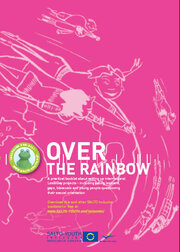Youth Worker Skills for LesBiGay Projects
- Find this and more in the SALTO Inclusion for All booklet: Over the Rainbow
- Besides the specifics of LesBiGay projects below, you can find inspiration for your programme of activities in the SALTO Toolbox for Youth Work and Training at www.SALTO-YOUTH.net/Toolbox/: get-to-know games, simulation games, group methods, energisers, exercises addressing social in/exclusion and discrimination,...
Specifics of the youth worker
Skills for handling LesBiGay issues
In order to give leadership on LesBiGay youth activities, as is the case on all international activities, there is a need for skilful youth workers who are able to manage the project by taking care and overseeing all aspects of it, such as intercultural learning, co-operation, youth participation, etc., as well as the technical aspects such as funding, reporting, bookkeeping, etc. Without sacrificing the technical competencies needed from youth workers, it is also essential to insist on having social or soft skills when dealing with this specific target group.
The youth workers, whether volunteers or employed, who coordinate international youth projects should be experienced and skilled in understanding and working with LesBiGay youth. Ideally, the youth workers should be familiar with all personal and interrelational aspects of homosexuality (i.e. identity, self-acceptance, coming-out etc.). That which young LesBiGays experience on an international activity can have a strong impact, either positive or negative, on their personal development. The youth workers are responsible for structuring and coordinating this experience for the young people and they should make it as beneficial as possible to them.
As well as being sensitive toward young LesBiGays' needs and developmental processes, the youth worker must also be conscious of their own role and limitations. None of us is a superman or a superwoman, so it is perfectly normal to require training to improve some of your skills. Check by yourself or with your colleagues as regards what your strengths and weaknesses are. You will more than likely be working in a team of youth workers, so different topics can be covered by different members of the team depending on their strengths.
^^ top ^^
Providing positive role models
The youth worker is continuously on stage and observed by the members of the group. Many LesBiGay young people are searching for role models; people they would like to become when they are older. Since you are in charge of the project and must coordinate the whole experience, you may well be regarded as a role model by some of the participants. Providing a positive example of how one can behave as an adult could be very instrumental for young people in the construction of their identities, especially if you are of the same sexual orientation. It gives them hope that they might also become like you. This can stimulate and motivate young people to accept themselves, to construct a positive image of themselves, to stand up for their rights and to dream of a positive future.
Youth workers are carefully observed during an exchange programme, especially in their way of handling different situations. It is important to always give a good example by being genuine and respectful. The youth worker can set the tone by using gender neutral wording (e.g. spokesperson instead of spokesman, etc.), by refusing heteronormative speech (e.g. married partners instead of husband and wife), by reacting firmly to homophobic comments or verbal abuse, by being respectful of differences, etc. Don't forget that a little humour can always help avoid depression. It is very likely that young people will aim to imitate an appreciated youth worker.
Youth workers are in a position of power and responsibility toward the young people in their care. Sometimes this power or a role model may appear attractive to young people and they may feel they have fallen in love. In other instances they may just be trying to provoke the youth worker. It would be all too easy to reciprocate the attention given to the youth worker by the young people. A youth worker is responsible for the whole group and giving too much attention to one of the participants, or to one of the team for that matter, will unavoidably detract attention and energy from the group. Therefore, it is unethical and unprofessional, and illegal in the case of underage participants, to start a relationship with one of the participants in a project. Youth workers and volunteers who are supporting young people with their sexual orientation and coming-out should set clear boundaries and rules about this transgression of roles.
^^ top ^^
Let's talk about sex
A person is made up of more than his or her sexuality. A lesbian also has a national or cultural identity, hobbies, a student or professional background, etc. Nevertheless, it is sometimes worthwhile bringing LesBiGay peers together in a safe environment where they can openly discuss issues that specifically matter to them. In the case of LesBiGay youth this involves homosexual or bisexual love, relationships and sex.
A youth worker who must deal with LesBiGay youth needs to be comfortable with and knowledgeable on LesBiGay sexuality. This subject will undoubtedly surface on several occasions during a LesBiGay project. It is important that the youth worker is kept up-to-date with the latest developments as regards sexual development and sexual health. It might also be considered wise to organise an information session or debate on safe sex. You may even consider distributing condoms amongst the participants for the purpose of safety. This, however, might be considered by parents, funding providers or politicians as the promotion of sexual acts amongst young people. It is up to you to argue the case in favour of safe sex and to judge the situation accordingly. You could discuss the issue with the participants and add some rules to the code of conduct for the project.
- "Different in more ways than one. Providing guidance for teenagers on their way to identity, sexuality and respect" is a publication about working with LesBiGay youth. It includes background reading and practical exercises (on LGBT & identity, sexuality, religion, subcultures, health,...). Download it from www.diversity-in-europe.org
- www.advocatesforyouth.org is an American organisation and website that aims to help young people to make informed and responsible decisions about their reproductive and sexual health. Advocates provides information, training and publications to youth-serving organizations, policy makers, youth activists, and the media - amongst others also about LGBTQ issues.
^^ top ^^
Downloads
The following downloads are available:
- Over the Rainbow - international LesBiGay projects - 2008 update
Inspiration & advice for setting up respectful projects with young gay lesbian bisexual people. Lots of information about project management, finding partners, funding,... Based on SALTO TC Rainbow 2005


